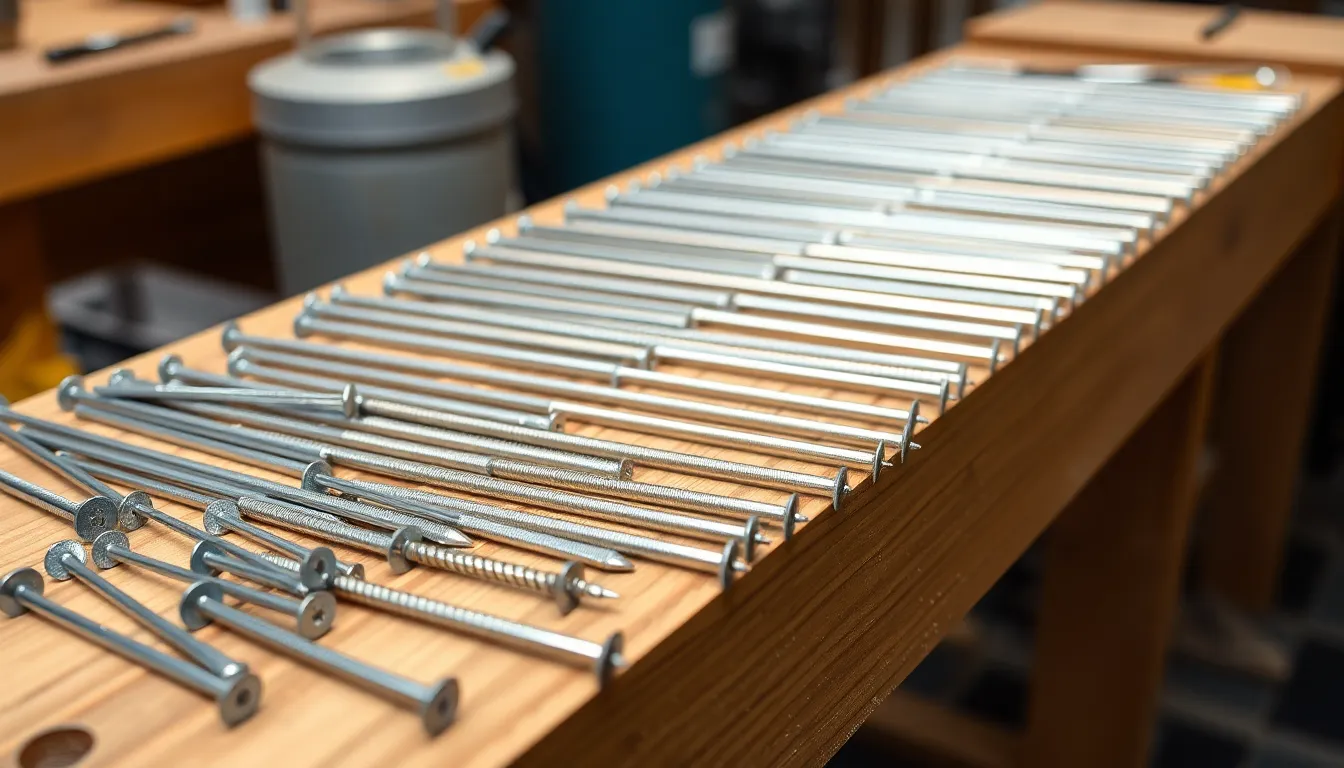Nails aren’t just for hanging pictures anymore. They’re the unsung heroes of construction and DIY projects, holding everything together while quietly judging your choice of décor. From framing a house to crafting a birdhouse, the right type of nail can make all the difference. But with so many options out there, how do you choose?
Overview of Types of Nails Hardware
Nails come in various types, each designed for specific applications. Common varieties include common nails, finishing nails, and roofing nails. Common nails are ideal for framing and structural work due to their strength and versatility.
Finishing nails feature smaller heads, making them suitable for trim work and cabinetry. The design of finishing nails minimizes visible holes post-installation. Roofing nails, with larger heads, securely attach shingles to roofs and resist water infiltration.
Specialty nails address unique needs in specific projects. For example, casing nails work well for molding and trim, while drywall nails feature a ringed shank for better grip in drywall installations.
Moreover, brad nails provide precision in delicate tasks like craft projects. These small, thin nails work effectively with pneumatic nailers, creating clean finishes without splitting wood.
Concrete nails serve a distinct purpose, anchoring materials to solid surfaces like concrete or masonry. Their hardened design ensures durability under stress.
Lastly, deck nails are designed for outdoor use, often coated to resist corrosion from moisture exposure. Choosing the right nail type affects the overall strength and durability of the structure, influencing the project’s quality.
Understanding these varieties aids in selecting the appropriate option based on the task’s demands. Each nail type plays a significant role in successful construction and DIY endeavors.
Common Types of Nails


Nails play a crucial role in construction and DIY projects. Each type serves specific functions, ensuring durability and strength in various applications.
Common Nail
Common nails excel in framing and structural work. They feature a thick shank and a flat head, providing significant holding power for large projects. Common nails typically range from 2 to 6 inches, accommodating diverse needs in construction. They are often used for securing wood to wood, reinforcing joints, and building frameworks. Choosing the right length and gauge ensures stability in assembled structures.
Finishing Nail
Finishing nails offer a discreet solution for trim and cabinetry work. Their small heads allow for minimal visibility, making them ideal for tasks requiring a clean finish. Ranging from 1 to 2.5 inches, these nails can penetrate soft or hardwood with ease. Crafted to support thin materials, finishing nails do not split wood easily. They help achieve a professional appearance with less effort in completing delicate projects.
Brad Nail
Brad nails are perfect for precision tasks in light applications. Measuring between 18 to 22 gauge and typically 1 to 2 inches long, they provide a lightweight option for delicate woodwork. These narrow nails feature smaller heads, reducing the need for filling holes post-application. Ideal for smaller projects like picture frames and decorative moldings, brad nails deliver a secure hold without compromising aesthetics.
Box Nail
Box nails are designed for lighter wood assemblies and construction. They feature a thinner shank compared to common nails, making them less likely to split wood during use. Typically ranging from 1.5 to 3 inches, these nails hold materials together efficiently. Box nails often find application in assembling boxes or crates, ensuring stability without excessive weight. Choosing box nails ensures proper performance in non-structural projects.
Specialty Nails
Specialty nails serve unique applications in construction and DIY projects. Each type addresses specific challenges associated with various materials and tasks.
Roofing Nail
Roofing nails play a crucial role in securing shingles to roofs. They feature a large, flat head that offers excellent holding power while preventing water infiltration. Typically made from galvanized steel, these nails resist rust and corrosion from harsh weather conditions. Many roofing nails also possess a ringed shank, providing increased grip within the roofing material. Proper use ensures long-lasting roof integrity, contributing to the overall durability of the structure.
Decking Nail
Decking nails are specifically designed for use in deck construction. These nails provide strong connections between deck boards and framing materials. With a thicker shank than standard nails, they resist bending during installation. Often coated with corrosion-resistant finishes, decking nails withstand exposure to moisture and outdoor elements. Many professionals prefer nails that are spiral or ring-shanked, enhancing their grip and preventing loosening over time. Selecting the right decking nail guarantees a stable and safe outdoor space.
Concrete Nail
Concrete nails serve as anchors for attaching materials directly to concrete or masonry. Crafted from hardened steel, these nails withstand the impact of driving into tough surfaces. Many concrete nails utilize a fluted or ringed design that enhances holding power, reducing the risk of pull-out. Installation typically involves a hammer or a concrete nail gun to ensure secure placement. Utilizing the correct concrete nail type results in adherence that supports various applications, from framing to securing fixtures.
Selecting the Right Nail for Your Project
Selecting the correct nail type is crucial for project success. Several factors influence this choice.
Considerations for Material
Different materials require specific nails for optimal performance. Wood, for instance, benefits from galvanized or stainless steel nails, which resist rust and corrosion. Metal structures demand fasteners like steel nails that offer superior strength. When securing concrete or masonry, use hardened steel nails for their durability. Additionally, the type of wood matters; softwoods can use standard nails while hardwoods often require specialized options to avoid splitting. It’s essential to match nail material to the project’s demands for long-lasting results.
Length and Gauge Factors
Nail length and gauge significantly affect holding power. For many applications, longer nails provide enhanced grip, especially in heavy-duty projects. A gauge number indicates thickness; lower numbers represent thicker nails. Using thicker nails helps prevent bending when driving them into dense materials. Conversely, lighter jobs benefit from thinner nails to minimize wood splitting. Gauge and length selection should adhere to the project requirements, ensuring stability and durability. Prioritizing these factors enhances overall construction quality.





